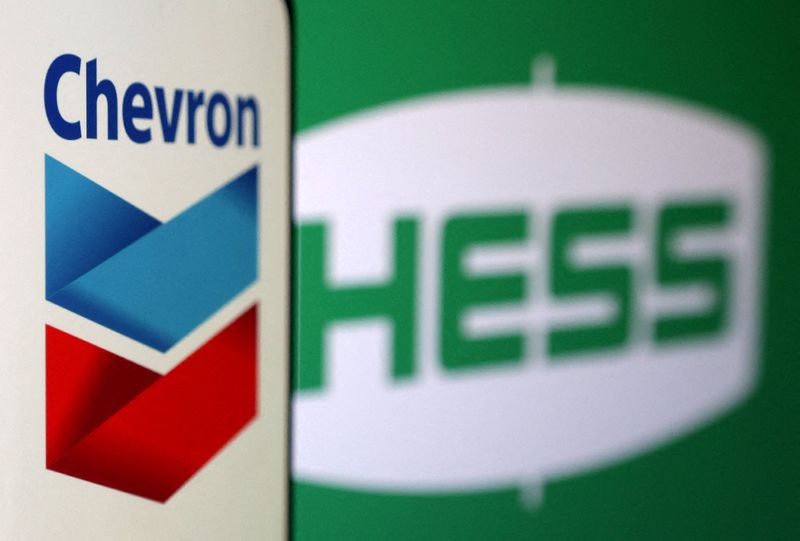By Tim McLaughlin
(Reuters) - Chevron’s deal to buy Hess (NYSE:HES) will unlock $15 billion worth of tax benefits that had once been relegated to the accounting dustbin, as the combined company takes advantage of Hess’s past losses to cut future payments, according to the company and tax experts.
The tax shield is a little-known advantage to Chevron (NYSE:CVX)'s mega-takeover of Hess struck last month. The tax benefits are expected to provide the No. 2 U.S. oil and gas producer hundreds of millions of dollars in extra annual cash flow over the next several years.
“The tax benefits were definitely factored into how Chevron valued Hess,” said Donald Williamson, an accounting professor at American University’s Kogod School of Business. “The Hess losses will allow Chevron to lower its tax rate significantly for several years.”
The 1918 Revenue Act first allowed corporations to carry their losses forward as tax benefits to smooth out large fluctuations in income over time. But the losses only come in handy if a company is eventually able to make enough money to have big tax bills.
Before the companies agreed to the $53 billion all-stock deal, Hess was sitting on more than $15 billion in net operating losses from previous years and unable to take advantage of them due to low profits and heavy losses, according to explanations Hess has provided in its financial statements.
The independent oil and gas driller had been stung badly by a crash in oil prices in 2016 and had never fully recovered.
Chevron Chief Financial Officer Pierre Breber told analysts in a conference call shortly after the Oct. 23 deal that Chevron would benefit from Hess’s past losses.
“When you combine the companies, we have the greater U.S. income, and we can use those net operating losses,” he said.
The company declined to provide any details about the size of the benefit.
Williamson explained that a 1986 tax code reform limits how much net operating loss a company can apply each year to its tax bill - a provision meant to discourage corporate takeovers just for the sake of trafficking in net operating losses.
That limit is calculated by multiplying the value of the takeover by the Applicable Federal Rate (AFR) published each month by the Internal Revenue Service.
In Chevron’s case, the net operating loss limit applied against U.S. income taxes could be as high $1.93 billion a year, Williamson said.
The bottom line effect, when that loss limit is multiplied by the U.S. federal tax rate of 21%, is extra cash flow that could top $400 million a year.
“There could be some items that would allow the amount to be higher or lower but this estimate gives a good starting figure,” said Jim Seida, an accounting professor at the University of Notre Dame.
TAXPAYER ANGST
Taxpayer advocates, already frustrated by low corporate tax rates, criticized the perk.
“The tax benefits going to Chevron and other U.S. corporations from net operating losses are absolutely undermining our federal budget,” said Jean Ross, an analyst at the Center for American Progress. “There’s a strong and appropriate case to increase the corporate income tax rate.”
Last year, corporate tax revenue totaled a record $425 billion, according to the Congressional Budget Office.
Over the past decade, Chevron's current U.S. federal tax expense has averaged $40 million a year. Last year, the company's current federal tax expense was $1.72 billion, or 8.2% of $21 billion in U.S. income, according to company financial statements.
Top U.S. oil company Exxon Mobil (NYSE:XOM) paid an even smaller percentage in 2022 on U.S.-based income. Its current federal tax expense last year was $696 million, or 2.5% of U.S. income of $28.3 billion, according to Exxon financial statements.
Exxon also will be able to cut its future tax bill somewhat with its $60 billion takeover deal last month of Pioneer Resources.
At the end of last year, Pioneer net operating losses that could be used to offset future U.S. federal taxes was pegged at $1.1 billion.
Exxon CEO Darren Woods, however, told Reuters the tax benefit was not a factor in the company’s decision to buy Pioneer.
“It’s too small,” Woods said after speaking at the Boston College Chief Executives Club luncheon on Nov. 1.
